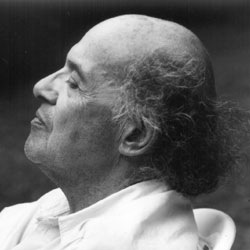When I fought the dog we almost danced
we loved each other that much and he was strong,
not counting even his teeth and claws, and I had
trouble pushing against him even though his
shoulders were weaker in that position nor was he
intended, as Aristotle might say, for fighting
standing up like that the way maybe a
bear was more intended or certainly an
ape with his gross imitation of a
human, or a human of him, if I can
step into that muck a minute, and he was
taller than me, as I remember, which made him
huge for a dog and made me feel small standing
on two legs with my weak left knee impaired
as it was and smelling his breath and shocked by his giant
head and what had to be a look I never
expected in his eyes, though I had to know
it would be like that for who was I anyhow
to bicker as I did or think that love
as I called it, all I did for him, the food
and water I gave him I could barter, I couldn’t
even find my pocket, I couldn’t take out a dollar.
Notes on the Poem
Who is in for the bigger surprise in Gerald Stern's "All I Did For Him": the poem's narrator or the poem's readers? Let's take a closer look at this selection from Stern's 2003 Griffin Poetry Prize shortlisted collection American Sonnets: Poems. This poem captures an amiable tussle between the narrator and his dog. "When I fought the dog we almost danced we loved each other that much" ... or wait, is it a friendly tango/tangle? When Gerald Stern read at the renowned Kelly Writers House in 2002, Tom Devaney's introduction included this reference to this very poem:"Listen to the counterbalancing of mind and body in the poem "All I Did for Him," where the poet wrestles with his dog and realizes that he is dangerously outmatched."The poem's play-by-play of this human/canine dust-up grows more ominous ... "smelling his breath and shocked by his giant head" then ... "what had to be a look I never expected in his eyes" not to mention plaintive ... "made me feel small standing on two legs with my weak left knee impaired" ... seguing in the end to the downright meek, cowed, somewhat desperate "all I did for him" that ruefully clarifies the poem's title. As the 2003 Griffin Poetry Prize judges observed:"When we finish one of these American sonnets, we laugh or cry out loud, incredulous."With this poem, flavoured with what the judges coined "milk and honey irony", we do both, most assuredly.
